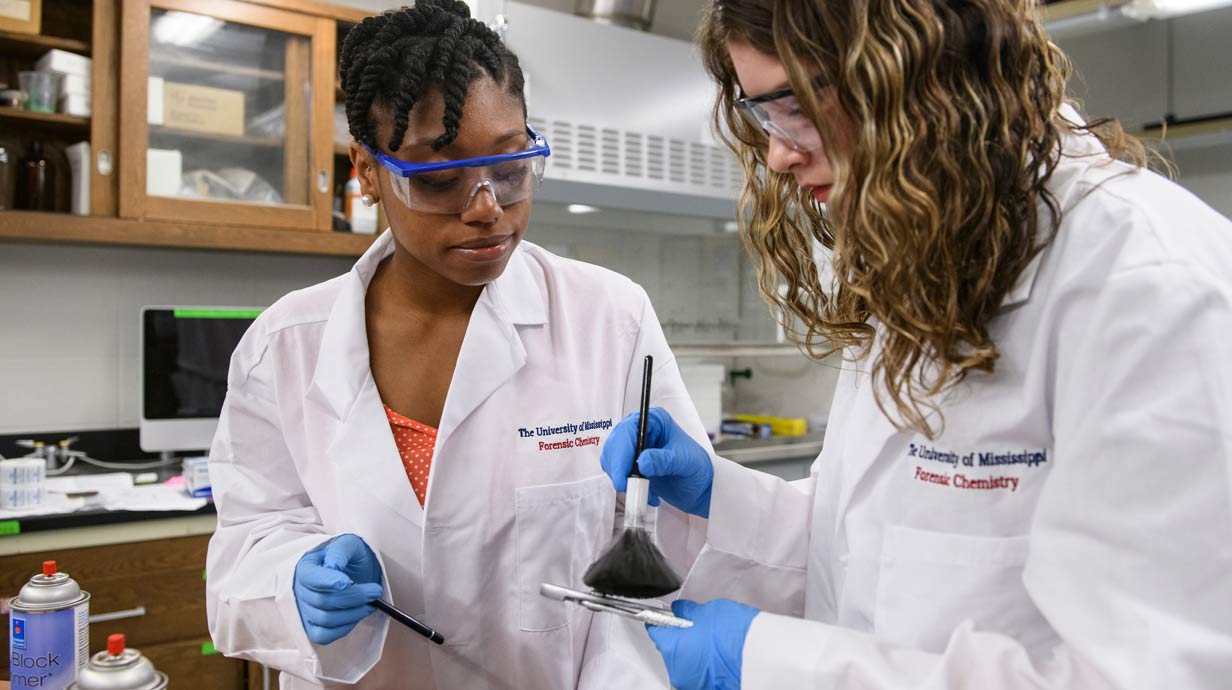Bachelor of Science in Forensic Chemistry
Apply the principles and tools of chemistry to the analysis of criminal evidence.

About this Program
The Department of Chemistry and Biochemistry in the College of Liberal Arts offers the B.S. in Forensic Chemistry. To be admitted to the degree program, students must meet certain prerequisites.
Our students focus on analytical chemistry and biochemistry/molecular biology, which culminates in a 10-week required internship at a state or federal crime laboratory that provides future employment opportunities. Students also perform original research.
The nationally ranked forensic chemistry program is one of only a few chemistry programs accredited by the Forensic Education Programs Accreditation Committee.
Student Success and Enrollment
Academic Common Market
The B.S. in Forensic Chemistry is part of the Academic Common Market (ACM), which is a cooperative agreement for sharing educational programs and facilities. The ACM lets residents of a participating state pursue academic degree programs that aren't offered in their home state without having to pay out-of-state tuition charges. The Southern Regional Education Board (SREB) coordinates the activities of the Academic Common Market for the thirteen participating states.
The Value of a Forensic Chemistry Degree
Forensic chemistry majors develop strong problem-solving skills. Understanding evidence requires tools from many disciplines, including chemistry, biology, materials science, and genetics. Public speaking skills and scientific competence are important characteristics for this career as forensic chemists must often explain what was found and how they arrived at their conclusions.
On this Page…
Program Information
Program Type
Major
Area of Study
Sciences, Mathematics, and Technology
School
Duration
4 years
Degree
B.S. in Forensic Chemistry
Program Location
Required Credit Hours
120
Degree Requirements
See information below on the Bachelor of Science in Forensic Chemistry. For a full description, visit the online catalog.
To be admitted in the degree program and to enroll in the required first chemistry course for the major, students must meet one of the following prerequisites:
ACT math subscore of 24 (SAT 580)
ALEKS online math placement test score of PPL 76
Grade of A or B in Chem 101 at the University of Mississippi
Grade of A or B in Math 121: Algebra and Math 123: Trig
Grade of A or B in Math 125: Basic Math for Science and Technology
Students in the B.S. in Forensic Chemistry completes 46 credit hours of chemistry courses
- Chem 105: General Chemistry I
- Chem 106: General Chemistry II
- Chem 115: General Chemistry Laboratory I
- Chem 116: General Chemistry Laboratory II
- Chem 221: Elementary Organic Chemistry I
- Chem 222: Elementary Organic Chemistry II
- Chem 225: Elementary Organic Chem. Laboratory I
- Chem 226: Elementary Organic Chem. Laboratory II
- Chem 314: Quantitative Analysis
- Chem 331: Physical Chemistry I OR Chem 334: Biophysical Chemistry
- Chem 441: Forensic Chemistry Senior Research
- Chem 459: Forensic Science Internship
- Chem 469: Introduction to Instrumental Analysis
- Chem 470: Forensic DNA Analysis
- Chem 471: Biochemistry I
- Chem 473: Biochemistry II
- Chem 512: Advanced Instrumental Analysis
One course from:
- CJ 230: Principles of Investigation
- CJ 310: Law Enforcement Process and Policy
- CJ 410: Criminal Procedure
One course from:
- Csci 251: Programming for Engineering and Sciences
- Bisc 440: Cell and Molecular Biology
- Chem 580: Molecular Biochemistry I
Additional Requirements:
- Bisc 160: Biological Sciences I
- Bisc 161: Biological Sciences I Laboratory
- Bisc 162: Biological Sciences II
- Bisc 163: Biological Sciences II Laboratory
- Bisc 336: Genetics
- Phcl 381: Introduction to Toxicology
- Chem 319: Chem & Phys Methods of Forensic Chem OR CJ 415: Forensic Science & Crime Scene Analysis
- Math 261: Unified Calculus & Analytic Geometry I
- Math 262: Unified Calculus & Analytic Geometry II
- Math 375: Introduction to Statistics I
- One of the following sequences
- Phys 211/212: Physics for Science & Engineering I,II with labs
- Phys 213/214: General Physics I,I with labs
What is Forensic Chemistry?
Connect with a Forensic Chemistry Major
What can I do with a forensic chemistry degree?
- Contractor, Aerotek
- Science Teacher, Hazel Green High School
- Forensic Toxicologist, University of Tennessee
- Expert Witness, Rile & Hicks
- Physician, Mid-South OB-GYN
- Anesthesiologist, Women's Hospital
- Forensic Scientists in AL, AR, GA, LA, MS, TN, TX
- Crime Analyst, US Department of Justice
- Firearms Examiner, Jefferson Parish Sheriff
- Chemist, Brazoria County Sheriff's Office
- Chief Investigator/Medical Examiner, MS Crime Lab
- Medical Science Liaison, Braeburn
- Global Strategic Program, Agilient Tech
- Mass Spectrometrist, Aegis Sciences Corp
Next Steps
Explore Affordability
We have a variety of scholarships and financial aid options to help make college more affordable for you and your family.
Apply to the University of Mississippi
Are you ready to take the next step toward building your legacy?



